 A visual communications company, All New Video, have announced a deal with BBC to enable feedback and input into TV programmes from viewers, video calling from 3G phones, Web cams and ISDN. On the voice side, it will add VoIP to its inbound voice channels.
A visual communications company, All New Video, have announced a deal with BBC to enable feedback and input into TV programmes from viewers, video calling from 3G phones, Web cams and ISDN. On the voice side, it will add VoIP to its inbound voice channels.
It will open up and encourage the input of BBC viewers into news television programmes, widening the chances for user-generated content. The first show will be ‘Have Your Say’ which is aired on BBC World and BBC News 24, which they hope will before the end of the month.
We think this is a really exciting idea, with the live element being the real revolution. We spoke to David Hogben, General Manager, to get the low down.
Webcam to Live Broadcast
During live shows, the producer will be able to ask viewers to join in with the programme, by connecting with their 3G mobiles (unlikely and expensive for the caller), or far more interestingly, their Webcams.
To get to add their two penny worth, prospective video chatters will go to the BBC News Web site and download an ActiveX control (sorry Windows only currently), which will pick up their Webcam and/or microphone, letting them connect.
As the Application can be downloaded by anyone, input can come from anywhere worldwide.
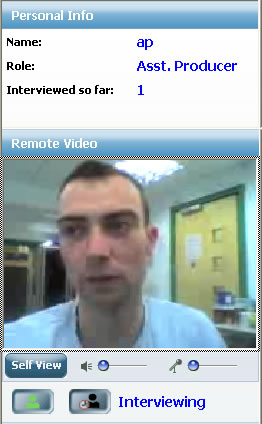 The system give the assistant producer the ability to carry out a video chat with the viewer letting them ascertain their suitability of the show – frankly, filter out those not relevant. Each person can also be ranked and some notes made about them.
The system give the assistant producer the ability to carry out a video chat with the viewer letting them ascertain their suitability of the show – frankly, filter out those not relevant. Each person can also be ranked and some notes made about them.
When the assistant producer thinks they’ve got the best of the bunch, they are passed in to a ‘waiting room’ where the producer can also chat with them, and then they decide if it’s time to put them live into the broadcast. As the 3G video is low res and the Webcam quality variable, it’s likely that video feeds will only be broadcast at quarter screen resolution for the time being.
The whole process runs through a Web-browser on All New Video’s servers, until the broadcast, when a server at the BBC is connected with, feeding the video and audio out through an SDI interface.
Video comments
Those old enough will remember UK broadcaster, Channel 4, used to have ‘feedback booths’ in a couple of UK cities where viewers were able to go into a darkened box and share their views with the UK audience.
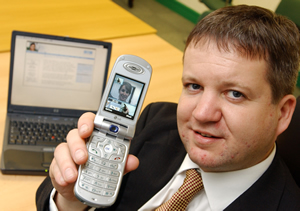 The new BBC system will let people do the same from the safety of their own bedrooms, where they’ll be able to leave their five minutes of video wisdom in a video mail system.
The new BBC system will let people do the same from the safety of their own bedrooms, where they’ll be able to leave their five minutes of video wisdom in a video mail system.
Background on All New Video
All New Video started in 2002 with the advent of 3G as they thought it would address a lot of the problems the founder, David Atkins, had encountered in their previous video conferencing business.
Their first big business win was a contact with Orange to supply the technology for their video answering service. Any time you can’t get through to someone with a video call on a 3G or 2.5G phone, you’re connected to the All New Video kit, where you can leave up to a 30 second message which is then delivered via MMS.
As we’ve been hearing from Vodafone recently, video calling isn’t being embraced by the 3G owning public, neither, more widely, is 3G. This lead to a rethink for them and a switch to including Webcams and other Internet technologies such as VoIP to be included.
They’ve previously done deals with two UK TV companies ITN and ITV’s breakfast show, GMTV. Neither are advanced as the BBC system advised today, with the ITN handling video messaging and the GMTV allowing video calls going direct to air, both from 3G phones.
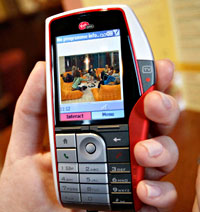 Virgin Mobile looks set to launch the UK’s first true mobile broadcast TV service in the autumn, with the beardy one’s empire releasing a rebadged version of BT’s Movio product.
Virgin Mobile looks set to launch the UK’s first true mobile broadcast TV service in the autumn, with the beardy one’s empire releasing a rebadged version of BT’s Movio product.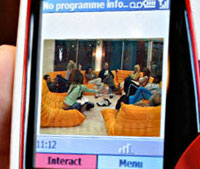 Movio uses a system known as DAB-IP, which has emerged ahead of the rival technology, DVB-H, because the required radio spectrum is already available.
Movio uses a system known as DAB-IP, which has emerged ahead of the rival technology, DVB-H, because the required radio spectrum is already available.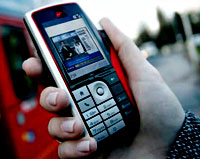 Exclusive
Exclusive One of the challenges facing Stephen Carter’s replacement as head of the UK communications regulator Ofcom, is how the frequency spectrum released by the move to digital terrestrial TV will be allocated. Not only is the decision crucial for Ofcom, who must reconcile both the requirement to allow the market to operate while taking into account the British citizen, but it also figures in the BBC’s strategy around the impending licence settlement and the organisations’ worldwide ambitions.
One of the challenges facing Stephen Carter’s replacement as head of the UK communications regulator Ofcom, is how the frequency spectrum released by the move to digital terrestrial TV will be allocated. Not only is the decision crucial for Ofcom, who must reconcile both the requirement to allow the market to operate while taking into account the British citizen, but it also figures in the BBC’s strategy around the impending licence settlement and the organisations’ worldwide ambitions. How will displays receive the content to create the impetus for a large scale take up? The likely options are; Cable under what is expected to be a Virgin branded offering; Sky who are pushing HD to protect and grow their revenue; the BBC who are committed to both an alternative to Sky on Satellite and providing their content on all viable platforms and broadband, which looks increasingly viable by virtue of higher transfer rates to the home, along with improved digital compression technologies.
How will displays receive the content to create the impetus for a large scale take up? The likely options are; Cable under what is expected to be a Virgin branded offering; Sky who are pushing HD to protect and grow their revenue; the BBC who are committed to both an alternative to Sky on Satellite and providing their content on all viable platforms and broadband, which looks increasingly viable by virtue of higher transfer rates to the home, along with improved digital compression technologies. France, slower off the blocks in moving to a Digital Terrestrial TV service, with its’ amusingly acronym-ed TNT, has a solution that builds in HD capabilities, and for sure the UK will not wish to be seen falling behind mainland Europe.
France, slower off the blocks in moving to a Digital Terrestrial TV service, with its’ amusingly acronym-ed TNT, has a solution that builds in HD capabilities, and for sure the UK will not wish to be seen falling behind mainland Europe. When it comes to World Cup football Web coverage in the UK, the BBC isn’t just dribbling past its rivals – it’s positively crushing past them, according to figures released by Nielsen NetRatings.
When it comes to World Cup football Web coverage in the UK, the BBC isn’t just dribbling past its rivals – it’s positively crushing past them, according to figures released by Nielsen NetRatings.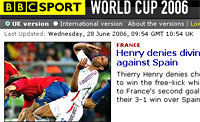 Interestingly, the Sporting Life site proved the ‘stickiest’ with punters spending the longest time on the site (an average of 36 mins each).
Interestingly, the Sporting Life site proved the ‘stickiest’ with punters spending the longest time on the site (an average of 36 mins each).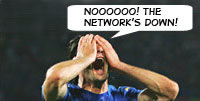 According to Internet research firm Nielsen/NetRatings, the BBC Sport Website is the most popular online source for World Cup news in the UK, with over 1.3 million footie fans visiting the site in the first week of the tournament.
According to Internet research firm Nielsen/NetRatings, the BBC Sport Website is the most popular online source for World Cup news in the UK, with over 1.3 million footie fans visiting the site in the first week of the tournament. “The large audience figures for the weekend shows the major advantages the Internet has in on-demand content,” he added.
“The large audience figures for the weekend shows the major advantages the Internet has in on-demand content,” he added.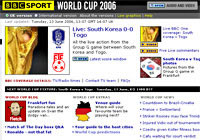 Mike Hemes, country manager for UK and Ireland at Packeteer, reckons that the bandwidth-busting footie action could cause big problems for IT managers, commenting: “It is likely that millions of workers will log on to watch matches due to faster Internet connections at work than at home …this will generate a huge surge in network traffic, eating into the bandwidth available to run business-critical applications effectively.”
Mike Hemes, country manager for UK and Ireland at Packeteer, reckons that the bandwidth-busting footie action could cause big problems for IT managers, commenting: “It is likely that millions of workers will log on to watch matches due to faster Internet connections at work than at home …this will generate a huge surge in network traffic, eating into the bandwidth available to run business-critical applications effectively.” Legally, a TV licence is required for any device that is “installed or used” for receiving television broadcasts, so that a networked PC used for streaming games needs a licence as well as the gogglebox at home.
Legally, a TV licence is required for any device that is “installed or used” for receiving television broadcasts, so that a networked PC used for streaming games needs a licence as well as the gogglebox at home.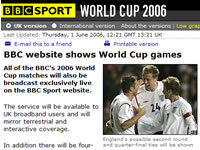 The BBC Sport Website will be carrying all of the World Cup 2006 football matches – Live. It will be only open to UK broadband users (or non-UK clever clogs who can set up a proxy or two).
The BBC Sport Website will be carrying all of the World Cup 2006 football matches – Live. It will be only open to UK broadband users (or non-UK clever clogs who can set up a proxy or two).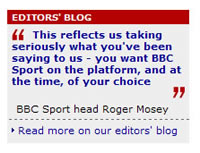 Panic in the network departments of companies around the UK will be settling in tomorrow morning as they realise quite how many of the employees will be sneaking a watch of the matches while at work. We suspect that bosses will be sanctioning, or possibly even buying TV for the staff to watch, rather than have their networks melt around them.
Panic in the network departments of companies around the UK will be settling in tomorrow morning as they realise quite how many of the employees will be sneaking a watch of the matches while at work. We suspect that bosses will be sanctioning, or possibly even buying TV for the staff to watch, rather than have their networks melt around them. As you’re no doubt aware, Guy Kewney is a contributor to Digital-Lifestyles. His old-school journalism is well-informed and his experience with technology is extensive. He’d been a journalist hero of ours since we were knee high to a
As you’re no doubt aware, Guy Kewney is a contributor to Digital-Lifestyles. His old-school journalism is well-informed and his experience with technology is extensive. He’d been a journalist hero of ours since we were knee high to a 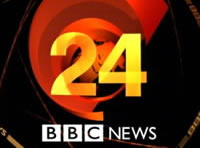 You must
You must  According to one paper this morning, the BBC has deleted the entire damning video. Untrue, I suspect; but even if true, the clip has circulated widely enough that it would be futile. And now that the Mail has done the deed and published the complete clip, you can actually download it.
According to one paper this morning, the BBC has deleted the entire damning video. Untrue, I suspect; but even if true, the clip has circulated widely enough that it would be futile. And now that the Mail has done the deed and published the complete clip, you can actually download it. The BBC is making its first steps into the super-crisp world of high definition television (HDTV) with transmissions of Planet Earth and Bleak House in the new format at the end of this month.
The BBC is making its first steps into the super-crisp world of high definition television (HDTV) with transmissions of Planet Earth and Bleak House in the new format at the end of this month. HD TV broadcasts can also beef up the whole big match experience by incorporating 5.1 surround sound and displaying the (Rooney-less) stadium action in widescreen.
HD TV broadcasts can also beef up the whole big match experience by incorporating 5.1 surround sound and displaying the (Rooney-less) stadium action in widescreen.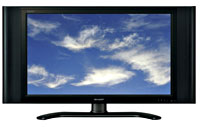 “We really feel that high definition will be the standard definition of the future,” she added.
“We really feel that high definition will be the standard definition of the future,” she added. The BBC are reporting that they are suspending a Blue Peter badge scheme. Why? Cheeky blighters are buying them on eBay and presenting them as if they ‘earned’ them and claiming the benefits.
The BBC are reporting that they are suspending a Blue Peter badge scheme. Why? Cheeky blighters are buying them on eBay and presenting them as if they ‘earned’ them and claiming the benefits. It is with great sadness that we hear that UK IPTV innovator KiT (Kingston interactive TV) is to close its doors on 3rd April. We’ve always been huge fans of their work.
It is with great sadness that we hear that UK IPTV innovator KiT (Kingston interactive TV) is to close its doors on 3rd April. We’ve always been huge fans of their work. It’s always struggled to get sufficient subscribers to support the service. Hull is an area with much financial deprivation with the average family income around £14,000/year. It’s understood that the high point of subscriptions, 10,000 at the start of the service, has lead to the current low point of 4,000. The level of financial loses and the need for KiT to refresh its now 7 year old IPTV kit is understood to have lead to the decision. The parent company, Kingston Communications (KC), feel that they can no longer justify supporting the service
It’s always struggled to get sufficient subscribers to support the service. Hull is an area with much financial deprivation with the average family income around £14,000/year. It’s understood that the high point of subscriptions, 10,000 at the start of the service, has lead to the current low point of 4,000. The level of financial loses and the need for KiT to refresh its now 7 year old IPTV kit is understood to have lead to the decision. The parent company, Kingston Communications (KC), feel that they can no longer justify supporting the service Unknown to many, Blockbuster Video have been running a VoD trial on KiT for a couple of years. Their first in the world.
Unknown to many, Blockbuster Video have been running a VoD trial on KiT for a couple of years. Their first in the world. There has been some wondering around the Digital-Lifestyles office if the delay in closing KiT has been a considered position by the KC. By waiting until now to close KiT, the rest of the world now realise that they all need to be in IPTV, and the number of potential purchasers will have increased.
There has been some wondering around the Digital-Lifestyles office if the delay in closing KiT has been a considered position by the KC. By waiting until now to close KiT, the rest of the world now realise that they all need to be in IPTV, and the number of potential purchasers will have increased.